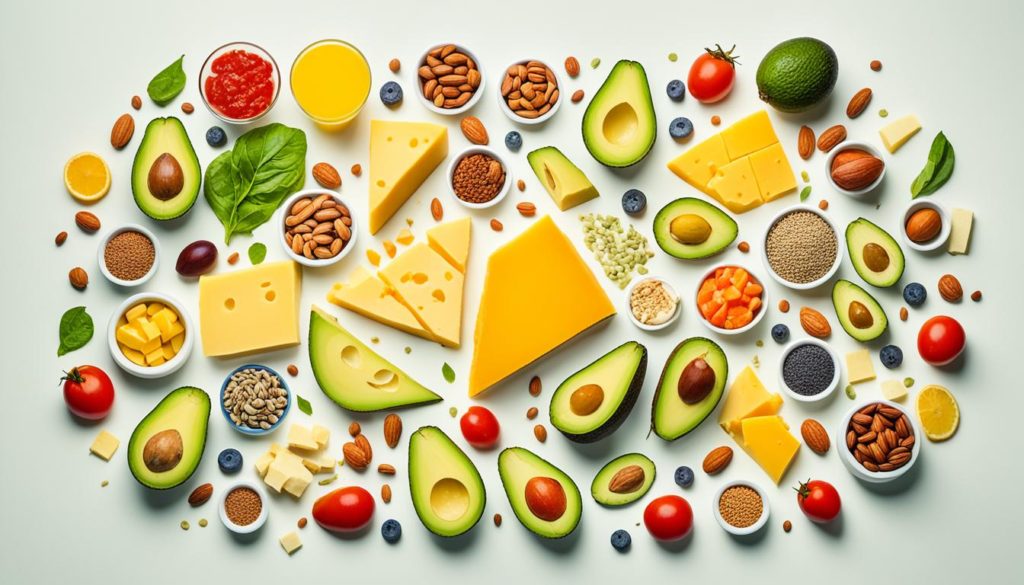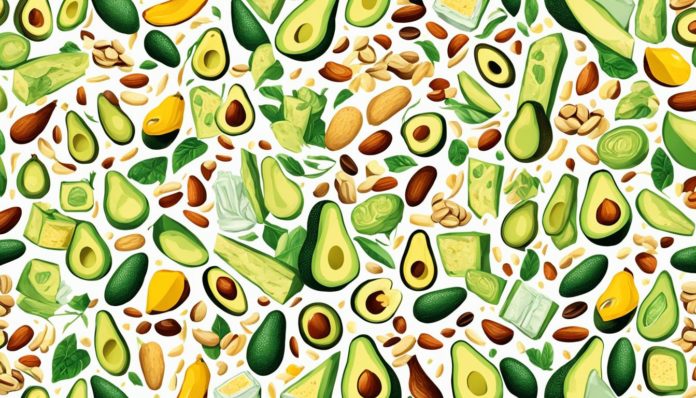Did you know dietary fats are crucial for your body’s health? In fact, your brain is almost 60% fat. This shows how important it is to eat the right fats every day. Knowing the types of fats, like saturated, unsaturated, and trans fats, helps you make better food choices.
This guide will explore the health effects of fats, their nutritional value, and how much you should eat. You’ll discover the key differences between fats and their roles in your health. Learning this is important if you want to boost your heart health, control your weight, or just eat better.
Key Takeaways
- Dietary fats are essential for overall health, despite their negative reputation.
- The human brain is nearly 60% fat, emphasizing the importance of fat in your diet.
- Understanding the differences between saturated, unsaturated, and trans fats can help you make healthier choices.
- Balancing different types of dietary fats is crucial for maintaining optimal health.
- This guide will cover health impacts, nutritional facts, and dietary fat consumption in detail.
Introduction to Dietary Fats
Dietary fats are key parts of our food and are crucial for many body functions. They are essential nutrients that help with energy, cell structure, and vitamin absorption. These fats also keep our skin healthy and balance our hormones.

Fats are made up of molecules called fatty acids. These fatty acids come in different types, each affecting health in its own way. Adding the right fats to our healthy eating patterns is key for staying well. But, not all fats are good for us. Some fats are healthy, while others can be bad if eaten too much.
The latest diet advice is to eat fats in balance. This means eating fewer bad fats and more good fats. By knowing the types of fats and their benefits, we can make better food choices. This helps us get the right essential nutrients for a healthier life.
Saturated Fats
Saturated fats are a type of fat found in many foods. They are solid at room temperature and have sparked debate among nutritionists. Knowing where these fats come from and their health effects is key to making good food choices.
Sources of Saturated Fats
Saturated fats are in both animal products and plant-based sources. Here are some main sources:
- Animal products like beef, lamb, pork, and poultry skin
- Dairy items such as cheese, butter, and cream
- Certain plant-based items like coconut oil, palm oil, and cocoa butter

Health Impacts of Saturated Fats
Eating saturated fats can raise blood cholesterol levels, leading to health problems. This includes heart disease. Studies show that a diet high in these fats may increase the risk of coronary artery disease by raising LDL cholesterol levels.
But, the science on saturated fats is changing. Some new studies say the link to heart disease is more complicated. It might depend on other foods and lifestyle choices. Still, groups like the American Heart Association advise eating less saturated fat for heart health.
Unsaturated Fats
Unsaturated fats are key for a healthy diet. They help keep your heart and overall health in top shape. By choosing wisely what you eat, you can lower the risk of heart disease and keep your cholesterol levels in check.
The Benefits of Unsaturated Fats
Eating unsaturated fats can make you healthier. These fats are great for your heart by lowering bad cholesterol and raising good cholesterol. They also help your brain work better and keep your cells strong. Foods like olive oil and fatty fish are perfect for getting these fats.
Types of Unsaturated Fats: Monounsaturated and Polyunsaturated
There are two main kinds of unsaturated fats: monounsaturated and polyunsaturated. Each kind is important for your health.
- Monounsaturated Fats: You can find these in olive oil, avocados, and nuts. They’re key for a healthy heart by cutting down bad cholesterol and helping manage blood sugar.
- Polyunsaturated Fats: These are in fatty fish, walnuts, and flaxseeds. They give you important omega-3 and omega-6 fatty acids. These are vital for your brain and fighting inflammation.
| Types | Sources | Benefits |
|---|---|---|
| Monounsaturated Fats | Olive oil, avocados, nuts | Improves cardiovascular health, reduces LDL cholesterol |
| Polyunsaturated Fats | Fatty fish, walnuts, flaxseeds | Supports brain function, reduces inflammation |
Trans Fats
Trans fats are a special kind of unsaturated fat made through a process called hydrogenation. This process adds hydrogen to liquid vegetable oils to make them solid. You can find these oils in many processed foods like baked goods, snacks, and fried foods. They help these foods last longer and taste better.
What Are Trans Fats?
Trans fats can come from nature or be made in a lab. Natural trans fats are in some meats and dairy. But most trans fats in foods come from hydrogenated oils, which are in many processed foods. These artificial trans fats are made when oils are partially hydrogenated, changing their structure to be solid at room temperature.
Health Risks Associated with Trans Fats
Eating trans fats can lead to cardiovascular risks. They raise the bad cholesterol and lower the good cholesterol. This can increase the risk of heart disease, stroke, and type 2 diabetes.
To lower these cardiovascular risks, the FDA has strict rules. These rules make food labels show trans fat content. This helps people make better choices. The FDA also wants to stop using oils that are high in trans fats because they are bad for the heart.
| Type | Source | Health Impact |
|---|---|---|
| Natural Trans Fats | Meat and Dairy Products | Potentially Less Harmful |
| Artificial Trans Fats | Hydrogenated Oils in Processed Foods | Increases Cardiovascular Risks |
Monounsaturated Fats
Monounsaturated fats are key to a balanced diet. They stay liquid at room temperature but turn solid when chilled. These fats are big in diets like the Mediterranean diet, known for its heart-healthy fats.
Sources of Monounsaturated Fats
It’s easy to add monounsaturated fats to your meals. Here are some top sources:
- Avocado
- Olive oil
- Nuts (e.g., almonds, cashews, and hazelnuts)
- Seeds (e.g., sesame and pumpkin seeds)
Health Advantages of Monounsaturated Fats
Adding monounsaturated fats to your diet boosts heart health. These fats lower bad cholesterol, cutting the risk of heart disease and stroke.
They also help with weight control. Foods like avocado and nuts in a Mediterranean diet make you feel full. This can help you manage your weight better.
| Health Benefits | Sources |
|---|---|
| Reduces bad cholesterol levels | Olive oil, Avocado |
| Diminishes risk of heart disease | Nuts, Seeds |
| Aids in weight management | Avocado, Nuts |
Polyunsaturated Fats
Polyunsaturated fats are key to a healthy diet. They are essential fatty acids that the body can’t make on its own. These fats are vital for keeping cells healthy and reducing inflammation. They help keep us healthy overall.
Understanding Polyunsaturated Fats
Polyunsaturated fats include omega-3 and omega-6 fatty acids. These essential fatty acids are crucial for many body functions. They help with brain development, blood clotting, and fighting inflammation. Eating the right amount of these fats is good for the heart and brain.
Sources of Polyunsaturated Fats
To get polyunsaturated fats, eat foods full of them. Here are some top sources:
- Vegetable oils: Soybean oil, corn oil, and sunflower oil are great for their polyunsaturated fats.
- Seed-based foods: Chia seeds, flaxseeds, and pumpkin seeds are packed with these fats and nutrients.
- Nuts: Walnuts and pine nuts are good for their healthy fats.
- Fatty fish: Salmon, mackerel, and trout are full of omega-3 fatty acids, a type of polyunsaturated fat.
| Source | Omega-3 Fatty Acids | Omega-6 Fatty Acids |
|---|---|---|
| Salmon | High | Low |
| Sunflower Oil | Low | High |
| Chia Seeds | High | Moderate |
| Walnuts | Moderate | High |
Omega-3 Fatty Acids
Omega-3 fatty acids are key for good health. They are known for helping the heart and brain. They also reduce inflammation, making them great for a balanced diet.
There are three main types: alpha-linolenic acid (ALA), eicosapentaenoic acid (EPA), and docosahexaenoic acid (DHA). ALA comes from plant oils, while EPA and DHA come from the sea. Getting enough of these fats is important for brain and heart health.
Fish oil supplements are a top way to get Omega-3s. They have lots of EPA and DHA. These fats help the heart by lowering bad fats and blood pressure. They also boost brain health, which may slow down cognitive decline and clear the mind.
You can also get Omega-3s from food. Fatty fish like salmon, mackerel, and sardines are full of EPA and DHA. For plant-based diets, chia seeds, flaxseeds, and walnuts have ALA. Adding these foods to your meals helps meet your Omega-3 needs.
It’s key to understand Omega-3s and use them daily, through food or supplements. This way, you get their anti-inflammatory effects and support your heart and brain health.
- Incorporate fatty fish into your meals at least twice a week.
- Consider fish oil supplements if your dietary intake is insufficient.
- Add plant-based sources of Omega-3s, such as chia seeds and flaxseeds, to your diet.
Omega-6 Fatty Acids
Omega-6 fatty acids are key for a healthy diet. They come mainly from plant-based oils, nuts, and seeds. These fats help control inflammation and keep the heart healthy.
Sources of Omega-6 Fatty Acids
Here are the main sources of omega-6 fatty acids:
- Vegetable oils like corn oil, safflower oil, and soybean oil
- Nuts and seeds, including walnuts, sunflower seeds, and pumpkin seeds
- Products like mayonnaise and salad dressings made from these oils
Benefits of Omega-6 Fatty Acids
Eating omega-6 fatty acids, especially linoleic acid, is good for your heart. It helps lower the risk of heart disease by managing inflammation. These fats also support brain function and growth.
But, it’s important to balance omega-3 and omega-6 intake. Too much of one can lead to health issues. This shows why eating a balanced diet is crucial.
Identifying Healthy Fats
Understanding healthy fats means learning to read nutrition labels and picking whole food sources over processed ones. This helps you make informed food choices that are good for your health.
Look at nutrition labels for the types and amounts of fats. Stay away from trans fats and cut down on saturated fats. Instead, go for unsaturated fats in whole food sources. These fats, like omega-3 and omega-6, are key for heart health, brain work, and lowering inflammation.
Adding healthy fats to your meals means choosing from these whole food sources:
- Avocados
- Olive oil
- Nuts and seeds
- Fatty fish like salmon and mackerel
- Chia seeds and flaxseeds
The table below shows why whole foods are better than processed ones for fats:
| Whole Food Source | Primary Healthy Fats | Health Benefits |
|---|---|---|
| Avocado | Monounsaturated fats | Lower cholesterol, improve heart health |
| Olive Oil | Monounsaturated fats | Reduce inflammation, improve cardiovascular health |
| Fatty Fish | Omega-3 fatty acids | Reduce risk of heart disease, enhance brain function |
| Nuts and Seeds | Polyunsaturated fats | Improve heart health, provide essential nutrients |
By focusing on nutrition labels and choosing whole food sources, you can make smart food choices. These choices support a balanced diet and help you stay healthy over time.
Types of Dietary Fats
Dietary fats are key for our health, playing important roles in many body functions. It’s crucial to know the different types of fats and how they affect us. This knowledge helps us plan our diets better.
The Role of Dietary Fats
Dietary fats give us energy and help cells grow. They protect organs and make sure we absorb nutrients well. Adding the right fats to our meals is key for good health. Here’s a quick look at what fats do:
| Type of Dietary Fat | Primary Role |
|---|---|
| Saturated Fats | Provide energy and support vitamin absorption |
| Monounsaturated Fats | Improve cholesterol levels and support heart health |
| Polyunsaturated Fats | Include essential fatty acids for brain function |
| Trans Fats | Mostly harmful; should be limited |
Balancing Different Types of Dietary Fats
It’s important to balance different fats for good health. Here are some tips:
- Limit saturated fats to less than 10% of daily calories.
- Prioritize unsaturated fats, like those in nuts, avocados, and fish.
- Avoid trans fats by checking labels and choosing natural fats.
- Include both omega-3 and omega-6 fatty acids in your diet.
By balancing fats, we can support our health and well-being over time.
Bad Fats: An Overview
Bad fats, also known as unhealthy fats, are harmful to our health if eaten too much. They are mainly saturated and trans fats. These fats are seen as bad by health experts.
Studies show that eating unhealthy fats can harm our health. Saturated fats are in foods like red meat, butter, and full-fat dairy. These fats can raise cholesterol and increase the risk of heart disease.
Trans fats are in foods like baked goods, margarine, and fast food. Eating these fats can lead to diabetes and heart disease.
| Type of Fat | Common Sources | Health Consequences |
|---|---|---|
| Saturated Fats | Red meat, butter, full-fat dairy | Increased cholesterol levels, risk of heart disease |
| Trans Fats | Baked goods, margarine, fast food | Higher risk of diabetes, coronary artery disease |
Experts recommend eating fewer unhealthy fats to stay healthy. Choosing healthier fats like those in nuts, seeds, and fish is better. This can improve heart health and overall well-being.
Conclusion
Knowing about different dietary fats is key to a healthy life. Each fat type, like saturated and unsaturated, has its own role. It’s important to balance your fat intake for good health. By learning about fats, you can eat better every day.
Healthy fats like monounsaturated and polyunsaturated fats are good for your heart and reduce inflammation. Omega-3 and Omega-6 fatty acids are crucial for your body. But, it’s important to eat less bad fats like saturated and trans fats, which can harm your heart and health.
Good eating habits are important for your long-term health. By knowing how fats affect you, you can make smart food choices. The goal is not to avoid fats but to choose the right kinds and amounts. Focus on healthy fats to support a balanced and healthy life.
FAQ
What are the different types of dietary fats?
There are four main types of dietary fats: saturated, unsaturated, trans fats, and omega-3 and omega-6 fatty acids. Each type affects health differently.
How do saturated fats affect my health?
Saturated fats are in animal products and some plants. Eating too much can raise heart disease risk. Experts suggest eating less of them for a healthier heart.
What are the benefits of unsaturated fats?
Unsaturated fats are good for you. They lower bad cholesterol and heart disease risk. You can find them in olive oil, fish, avocados, and nuts.
Why are trans fats harmful?
Trans fats come from hydrogenation and are in many processed foods. They increase bad cholesterol and heart disease risk. The FDA has worked to reduce their use because of health dangers.
Where can I find monounsaturated fats?
You can find monounsaturated fats in avocados, nuts, and olive oil. They’re key to the Mediterranean diet and help with heart health and weight management.
What are polyunsaturated fats, and why are they important?
Polyunsaturated fats include omega-3 and omega-6, which your body can’t make. They keep cells healthy and fight inflammation. You can get them from vegetable oils and seeds.
What are Omega-3 fatty acids, and how do they benefit health?
Omega-3s are in polyunsaturated fats and fight inflammation. They’re good for the brain and heart. You can find them in fish oil, fatty fish, flaxseeds, and walnuts.
What role do Omega-6 fatty acids play in the diet?
Omega-6s are vital fats in vegetable oils and nuts. They manage inflammation and support health. It’s important to balance omega-3 and omega-6 for disease prevention.
How can I identify healthy fats in my diet?
Look for whole foods and check labels to avoid trans fats and limit saturated fats. Use olive oil, avocados, nuts, and fatty fish for health benefits.
How do dietary fats contribute to balanced nutrition?
Dietary fats are crucial for energy, cell structure, and vitamin absorption. A mix of fats ensures good health. Following guidelines and eating a variety of fats is key to balanced nutrition.
What are considered bad fats, and why should they be limited?
Bad fats are trans fats and too much saturated fat. They’re linked to heart disease and high cholesterol. Eating less of these fats helps prevent health problems.


